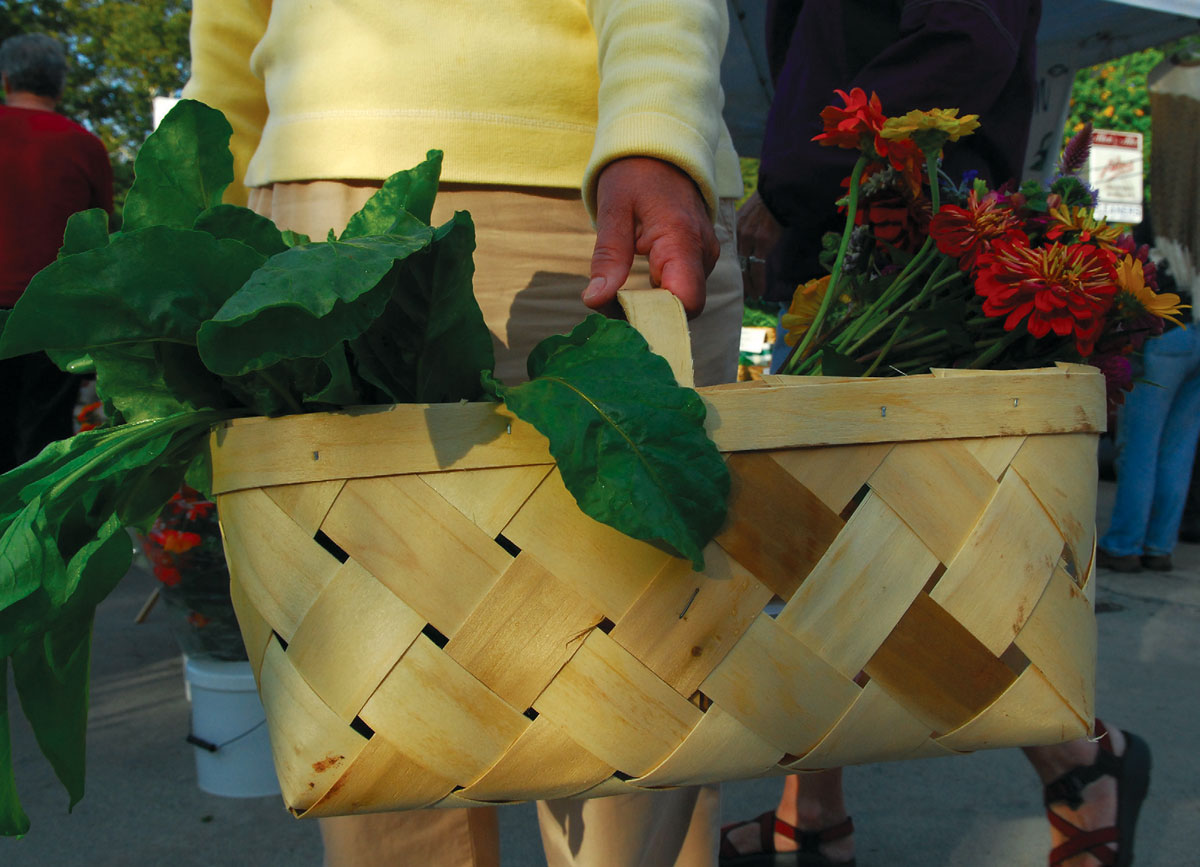Sharing the Harvest: A 20-Year Celebration of Iowa’s CSA Farmers
In 1993, couple Tim Landgraf and Jan Libbey feared what might happen when a neighbor proposed the expansion of his industrial hog operation. This not-so neighborly debate continued to escalate for years, threatening the couple’s dreams of raising children on a habitat-rich farm, as their property—located across from a natural wetland in Kanawha—symbolized a deep devotion to social justice, environmental conservation and family values. Something had to change.
On April Fool’s of 1994, Susan Jutz purchased a 80-acre property in Solon. Susan and her four children attempted to raise livestock and make cheese during ZJ Farm’s infancy, yet none of these proved to be viable pursuits for such a large family. Determined to make a living as a farmer, Susan began searching for a different business model that could be both profitable and sustainable.
After spending three years in El Salvador, Gary Guthrie returned to Iowa in 1990 and spent the next five years wrestling with what he describes as an “agricultural itch.” Though he explored various professional opportunities, nothing seemed a proper match for the community-building skills he gained while abroad, and it wasn’t until 1995 that he discovered a farming venture that matched his interpersonal values.
During this time, somewhat serendipitously, Tim, Jan and Susan also found the long-awaited solution to their respective problems—community supported agriculture (CSA). “This was way before any of us had the Internet,” Susan said. “But somewhere, somehow, this was percolating in the atmosphere.”
In the traditional sense, CSA farmers grow as much food as possible for local “share-members” whose up-front payments guarantee a weekly box of produce throughout the growing season. At least 75 CSAs now exist in Iowa, many of which are owned by young farmers who have expanded and reshaped CSAs to include meat, eggs, à la carte options, biweekly deliveries and online ordering systems. But without the visionary work of Susan, Gary, their co-patriots and organizations such as Practical Farmers of Iowa (PFI), community supported agriculture might not even exist in Iowa.
Though CSAs began in New England during the 1980s and quickly became popular on the West Coast, it took another decade before the movement reached the Midwest. Jan and Tim, who are now in their twentieth year of CSA production at One Step at a Time Gardens, first encountered this model at an organic farming conference in Wisconsin during the early 90s. Still, Jan didn’t encounter CSAs in her home state until a feature ran on Iowa Public Television’s news show Market to Market. With invigorated interest, Jan and her husband, along with Susan and Gary, attended their first PFI conference in 1995 to brainstorm for the future.
Shortly thereafter, a symbiotic swell of passionate individuals, bold ideas and local non-profits took the CSA movement in a brave new direction. Jan’s friend Shelly Gradwell soon founded Magic Beanstalk, one of three CSAs that began as Iowa’s first in 1995. A year later, in collaboration with PFI and the Leopold Center for Sustainable Agriculture, Shelly co-hosted a day-long CSA workshop at the Iowa 4-H Center in Madrid. Susan, Gary, Jan and Tim all mark this workshop as a critical turning point in both their personal and professional lives.
“I walked away from that talk and thought, maybe this might be it,” Gary said. “Ultimately CSA would allow me to incorporate everything in my life and put it into one life’s work, which is agricultural development, community development and spirituality, and be able to do it on the farm. So at 40 years old I finally grew up and found out what I wanted to do for the rest of my life.”
In 1997, Gary established his CSA on Growing Harmony Farm in Nevada and quickly earned the royal title of “Carrot King” due to the bountiful supply of root vegetables provided to his share-members. Though he has since semi-retired, Gary tripled his income during the lifespan of his full-scale CSA operation and credits much of his success to member appreciation potlucks that featured warm apple pie and homemade ice cream. “Between home deliveries and offering pies, I always drew people in,” he said.
Susan, who co-founded Local Harvest CSA in 1996, is arguably this movement’s greatest success story. Though her co-founders soon left the business, Susan dedicated several more years of her life to weekly CSA presentations for different civic groups around the state. This positioned her as a visible advocate that earned converts and customers alike in the Iowa City area. At its peak, Local Harvest served 300 share-members—more than double what most CSA farmers even attempt.
“I discovered that it was a perfect fit for me,” Susan said. “I had small children—2, 6, 8 and 10—when I started the farm, and I needed something that would keep me at home with them as much as possible. It was something they could be involved in, it was reasonably safe for them to be out in the field with me, and so they quickly became my main workers. From a family perspective, it was a really workable option.”
Susan’s success also provided inspiration to Jan and Tim. Following the 4-H Center workshop, Jan became more involved with slow-food activism as the coordinator of the Iowa Network for Community Agriculture. Likewise, Tim became a full-time farmer in 2002, which marked the couple’s seventh CSA season. Thirteen years later, this continued commitment to agriculture and community has enabled Jan and Tim to serve as mentors for new CSA farmers, many of whom work as summer interns on the couple’s self-described “teaching farm.”
“Several of those folks have gone on to start their own farming ventures—not all of them, but some—and that’s been a tool to grow the movement,” Tim said. “So the opportunity to work with our staff and our interns and other local folks, that’s been a treasure. They’re smart people, they work hard, but we laugh a lot. That makes the work enjoyable.”
Julia Slocum, founder of Lacewing Acres in Ames, developed her business plan while interning with Tim and his wife in 2012. Soon after, she met Gary at a PFI conference, and he later introduced her to the couple she would eventually rent land from during her CSA’s first two seasons. Now approaching her third year, Julia has relocated to acreage near Prairie Bloom Farm, where she hopes to expand her operation from 40 share-members to 65 after a disappointing second season of heavy rains.
“I had to stop going to farmers’ market the last month because I wouldn’t have enough produce for my CSA,” Julia said. “It was more important to keep my membership happy and I feel really good about that call. I’m sure they got tired of kale, but I was touched by how many people said, ‘We’re in it for the long view. We’re your CSA members and we plan to do this for years, so if we have one rough year, that’s no big deal.’ And that’s a pretty amazing thing to experience.”
“Gary helps with technical questions, but I think what he’s been exceptional at is the emotional and spiritual part of being a farmer,” she said. “He’s told me several times not to base any of my opinions of farming on these last two years and just start over at this new location, treat it like it’s a fresh start.”
Kate Edwards, operator of Wild Woods Farms in Solon, understands these feelings of struggle and doubt, as she began her CSA in 2011 with limited agricultural experience. And like Julia, Kate also received guidance from veteran CSA farmers, including Gary and Susan. However, the latter relationship proved to be the most beneficial—the two women, alongside land owner Dick Schwab, opened the Farming Institute in 2013, which provides business planning and life-coaching skills to other beginning farmers.
“Having a mentor for back-up is so important, because we’re part of a profession that supports each other, where we care about each others’ success, so we are not going to let the other person fail,” Kate said. “I can’t tell you how many times I’ve called up people, thinking, I don’t know if I can do this anymore, and I’ll get encouragement from Gary or Susan or other mentors who say, ‘No, look at the bigger picture and how we care about delivering healthy food to people.’”
Though hard-working CSA farmers might not have a rich and glamorous life, they are more than wealthy in the love and support they receive from community members. All of these farmers—Tim, Jan, Susan, Gary, Julia and Kate—cite providing sustenance to children and soon-to-be mothers as the single most rewarding aspect of operating a CSA. For instance, Julia recently became the nanny for a share-member couple’s newborn. “It’s the farm that brought us together—it’s amazing that the first veggies this little baby eats will be food I grew,” she said.
The CSA model’s emphasis on quality, taste and freshness appealed to Iowa City residents Chad and Tina McPherson, who joined the Wild Woods Farm CSA three years ago. The McPhersons made a commitment to “Farmer Kate” (as Chad endearingly refers to her) when Tina’s corporate office became a CSA drop-off site. As parents of 3-year-old Page and 20-month-old Luke, the McPhersons wanted to raise their children on the healthiest food possible—in fact, Tina made her own baby from Kate’s beets, carrots and sweet potatoes.
“Now Luke will eat entire bags of Kate’s tomatoes right off the counter,” Tina said. “If we try to feed him tomatoes from the store, he refuses to eat them, he has absolutely no interest. So the kids eat more vegetables from Kate than they ever do in the off-season. Their tastes buds can definitely tell the difference.”
Tomato-loving babies certainly add validation to the growing success of the local foods movement, yet differing opinions still exist amongst farmers concerning the future of CSAs. Jan and Tim believe that a new model—food hubs—might position local foods into greater economic and geographic accessibility. Susan takes issue with the ever-loosening definition of CSA and warns that large competitors already misuse the word to compete with beginning farmers in other areas of the countries. Julia remains cautiously optimistic about CSAs, though she has her doubts, while Kate seems the most hopeful.
“The future of the food systems depends on the consumer,” Kate said. “They have the food dollar and the ability to say, ‘I am going to stand and support a farm.’ I don’t care if you purchase mine or not, just get a CSA. It’s not a competition. If your needs meet mine, join mine, but if another one fits, by all means, join theirs.”




